Former Prime Minister of India dies at 92

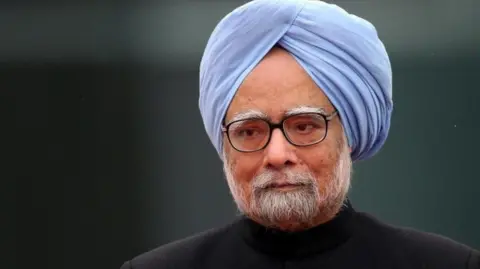 Getty Images
Getty ImagesFormer Indian Prime Minister Manmohan Singh has died at the age of 92.
Singh was one of India’s longest-serving prime ministers and was regarded as the architect of key economic reforms, serving as prime minister from 2004-2014 and before that as finance minister.
He was admitted to a hospital in the capital Delhi after his condition worsened, reports said.
Singh was the first Indian leader since Jawaharlal Nehru to be re-elected after serving a first full term, and the first Sikh to hold the country’s highest office. He publicly apologized in parliament for the 1984 riots in which about 3,000 Sikhs were killed.
But his second term in office was marred by a series of corruption allegations that plagued his administration. These scandals, many say, are what caused his Congress party to suffer a heavy defeat in the 2014 national elections.
Singh was born on 26 September 1932, in a desolate village in the undivided Punjab province of India, without both running water and electricity.
After studying at the University of Panjab he took a masters degree at the University of Cambridge and then received a DPhil at Oxford.
While studying at Cambridge, lack of funds worried Singh, his daughter, Daman Singh, wrote in a book about her parents.
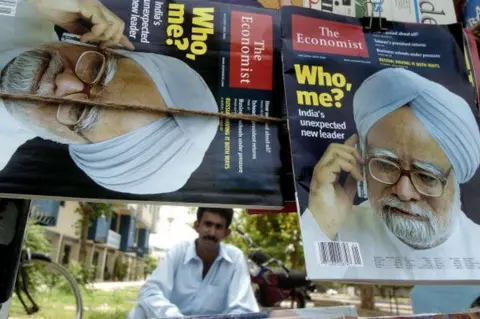 Getty Images
Getty Images“The tuition and living expenses were about £600 a year. A scholarship from Panjab University gave him about £160. The rest he had to rely on his father. Manmohan made sure he lived very comfortably. It was two and six shillings cheap.”
Daman Singh remembered his father as “unable to help himself around the house and unable to boil an egg, or turn on the television”.
A consensus builder
Singh rose to political prominence as India’s finance minister in 1991, taking over as the country sank into bankruptcy.
His unexpected appointment capped a long and distinguished career as an academic and civil servant – he served as an economic adviser to the government, and became the governor of India’s central bank.
In his first speech as finance minister he quoted Victor Hugo, saying “no power on Earth can stop a vision whose time has come”.
That served as the launching pad for an ambitious and unprecedented economic reform program: he lowered taxes, devalued the rupee, privatized state-owned enterprises and encouraged foreign investment.
The economy was revived, industry grew, inflation was checked and growth rates remained high throughout the 1990s.
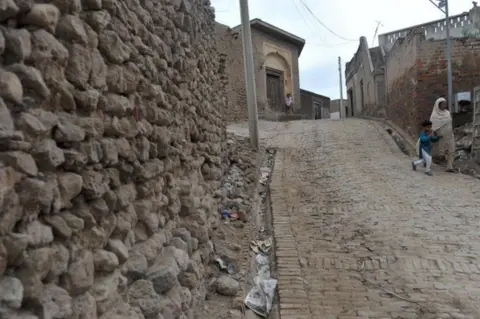 Getty Images
Getty Images‘PM by accident’
Manmohan Singh was a man who was well aware of his lack of political background. “It’s nice to be a politician, but to be a democratic leader you must first win an election,” he said.
When he tried to win the elections for the lower house of India in 1999, he lost. Instead he sat in the upper house, elected by his Congress party.
The same thing happened in 2004, when Singh was appointed prime minister after Congress president Sonia Gandhi turned down the post – apparently to protect the party from damaging attacks because of her Italian origins. Critics, however, suspect that Sonia Gandhi was the real source of power when she was prime minister, and that she never really governed.
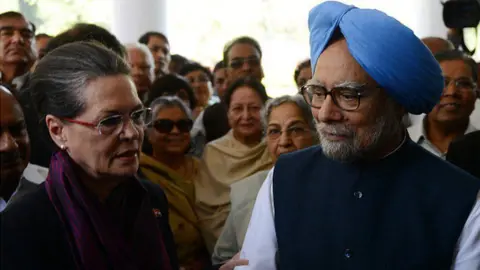 AFP
AFPA major victory in his first five-year term was to bring India out of nuclear isolation by signing a landmark agreement guaranteeing access to American nuclear technology.
But the deal came at a heavy price – the government’s Communist allies withdrew support after protesting, and the Congress had to make up for lost numbers by asking for the support of another party amid accusations of vote-buying.
A consensus builder, Singh oversaw a sometimes difficult, assertive and potentially unruly coalition of regional allies and supporters.
Although he was respected for his integrity and wisdom, he also had a reputation for being soft-spoken and indecisive. Some critics say that the pace of reforms has slowed down and that he failed to achieve the momentum he had when he was finance minister.
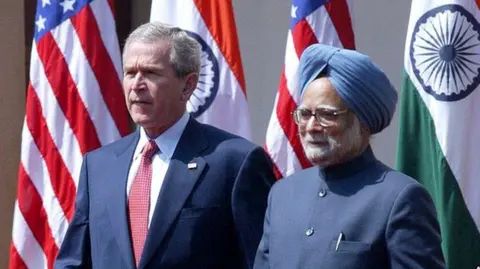 AFP
AFPWhen Singh guided the Congress to a second, decisive victory in the 2009 general election, he vowed that the party would “rise up victorious”.
But the luster began to fade quickly and his second term made headlines mainly for the wrong reasons: several scandals involving his cabinet ministers that allegedly cost the country billions of dollars, parliament was suspended by the opposition party, and major policy failures. which led to the Great Depression.
LK Advani, a senior leader in the rival BJP, called Singh India’s “weakest prime minister”.
Manmohan Singh defended his record, saying that his government had worked with “great commitment and dedication for the sake of the country and the welfare of its people”.
Pragmatic foreign policy
Singh adopted the rational foreign policies pursued by his two predecessors.
He continued the peace process with Pakistan – although this process was derailed by an attack by suspected Pakistani terrorists, which resulted in the Mumbai shooting and bombing in November 2008.
He tried to end the border dispute with China, he made an agreement to reopen the Nathu La pass in Tibet which had been closed for more than 40 years.
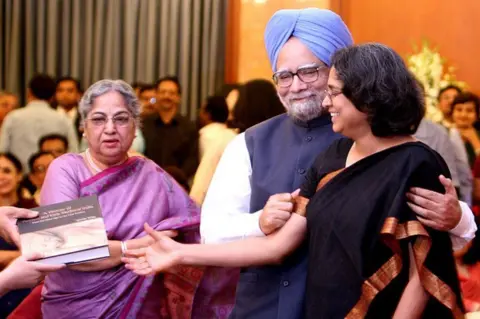 Getty Images
Getty ImagesSingh increased financial support for Afghanistan and became the first Indian leader to visit the country in nearly 30 years.
He has also angered many opposition politicians by appearing to cut ties with India’s old ally, Iran.
A low level leader
He was a diligent and senior student, known for his hard work and always kept a low profile. His social media account was mostly characterized by negative content and had a limited number of followers.
A man of few words, his calmness nevertheless won him many followers.
Responding to questions about the coal scandal involving the illegal distribution of licenses worth billions of rand, he defended his silence on the issue by saying “it is better than thousands of answers”.
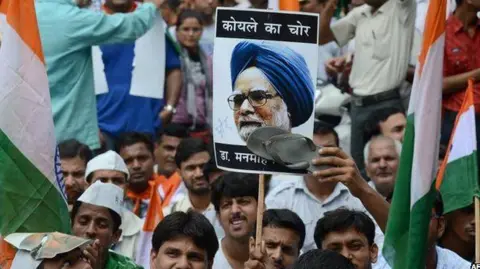 AFP
AFPIn 2015 he was summoned to court to answer charges of criminal conspiracy, breach of trust and corruption. An angry Singh told reporters that he was “open to legal scrutiny” and that “the truth will emerge”.
After his tenure as prime minister, Singh remained focused on the affairs of the day as a senior leader of the opposition Congress despite his growing age.
In August 2020, he told the BBC in a rare interview that India needs to take three steps “immediately” to stop the economic damage of the coronavirus pandemic, which has caused the country’s economy to collapse.
The government needs to provide direct financial assistance to people, make money available to businesses, and fix the financial sector, he said.
History will remember Singh for getting India out of economic and nuclear isolation, although some historians may suggest that he should have retired earlier.
“I truly believe that history will be kinder to me than the current media, however, the opposition parties in parliament,” he told an interviewer in 2014.
Singh is survived by his wife and three daughters.
Source link




